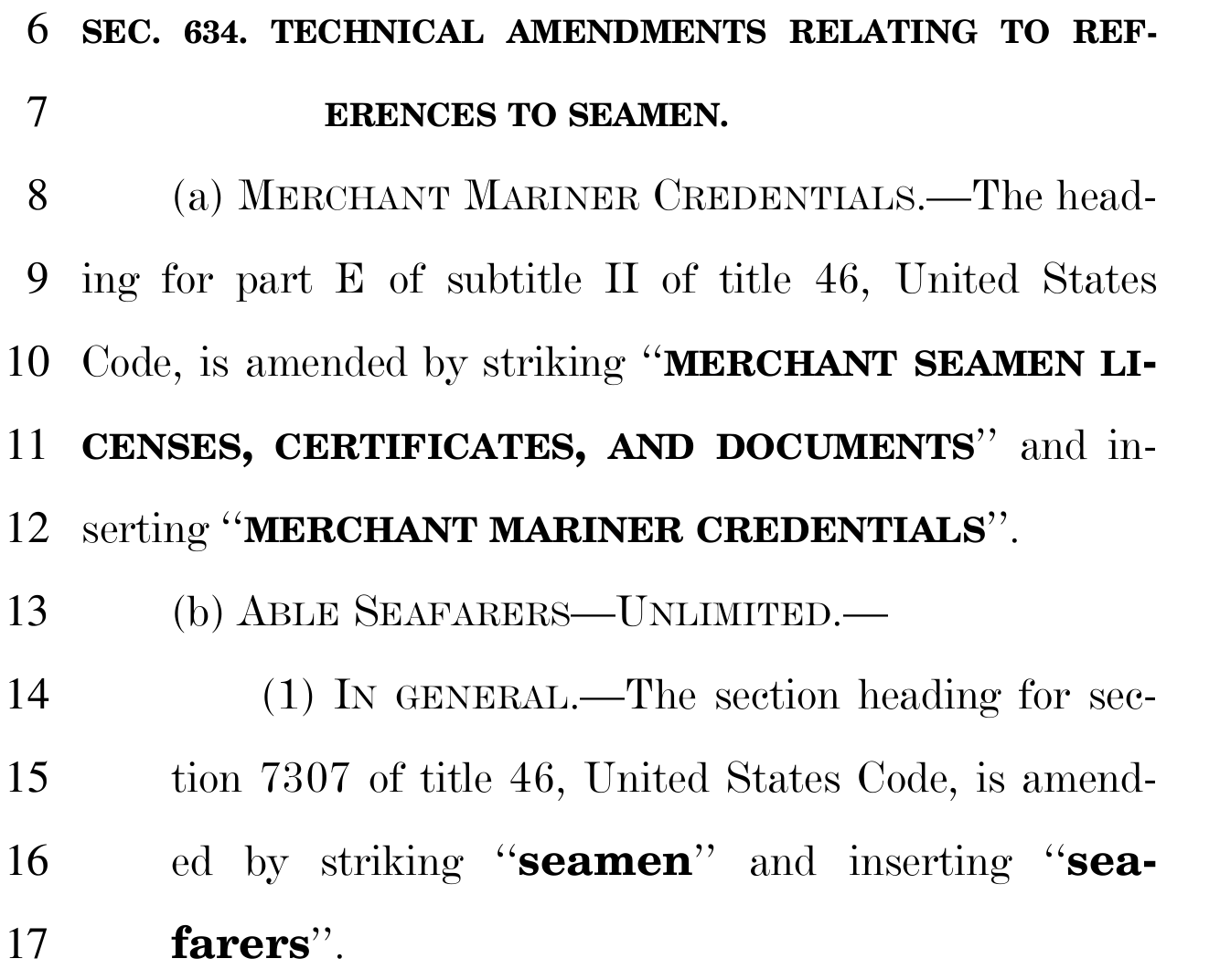The Ships Act: From Glory to Bufoonery in 305 pages
...the usual suspects are hijacking important legislation, again
If we are going to have a chance to meet the People’s Republic of China west of the International Date Line when she decides it is time, we have to get our maritime industry healthy and our Navy out of the doldrums.
Well-meaning, serious people who understand how power works in the Pacific understand this and have been waiting for the right people in Congress to take action to that effect..
We were only ready to defeat Imperial Japan and Nazi Germany in the 1940s because in the mid-1930s smart people in the House and Senate started a series of bills that underwrote an expansion of our shipbuilding capability, merchant marine, and Navy.
Sea power is not built by think tanks, panel discussions, ponderous documents, and well socialized speeches. No. Sea power is built by good leaders, effective process, and cold hard cash. That starts in Congress. If we need to sustain combat operations over months to years in the Western Pacific, the best time was to start 20 years ago…at a minimum 5 years ago. The third best time is now.
BZ to Senator Mark Kelly (D-AZ) for taking point on this action. (With one exception that I will put at the end). I am sure he is not the one who dropped the cultural Marxist turd in the sea power punch bowl, but someone on staff did. With the likely confirmation of Rep. Mike Waltz (R-FL) as the next National Security Advisor pending confirmation who is fully aligned on this topic—expect great things—but not yet.
Bad faith actors, and unserious people, have once again hijacked important legislation in a drive to get something no one wants but them—holding hostage unrelated important for their unimportant fetish. Like a parasite, they find a healthy host and tuck themselves away in the folds and hard to reach places in a hope no one finds them feeding.
First, the good stuff. Things Senator Kelly and his colleagues should be proud of.
Today, Senator Mark Kelly (D-AZ), Senator Todd Young (R-IN), Representative John Garamendi (D-CA-8), and Representative Trent Kelly (R-MS-1) introduced the Shipbuilding and Harbor Infrastructure for Prosperity and Security (SHIPS) for America Act, comprehensive legislation to revitalize the United States shipbuilding and commercial maritime industries. After decades of neglect, the United States has a weakened shipbuilding capacity, a declining commercial shipping fleet that is dwarfed by China, and a diminished ability to supply the U.S. military during wartime.
This historic bipartisan proposal would restore American leadership across the oceans by establishing national oversight and consistent funding for U.S. maritime policy, incentivizing domestic shipbuilding, enabling U.S.-flagged vessels to better compete in international commerce, rebuilding the U.S. shipyard industrial base, and expanding the mariner and shipyard workforce.
Senator Todd Young (R-IN) echos our stable of navalists.
“America has been a maritime nation since our founding, and seapower was a significant contributor to our rise to being the most powerful nation on earth. Unfortunately, the bottom line now is America needs more ships. Shipbuilding is a national security priority and a stopgap against foreign threats and coercion. Our bill will revitalize the U.S. maritime industry, grow our shipbuilding capacity, rebuild America’s shipyard industrial base, and support nationwide workforce development in this industry. This legislation is critical to our warfighting capabilities and keeping pace with China,” said Sen. Young.
Where does this focus?
The SHIPS for America Act would:
Coordinate U.S. maritime policy by establishing the position of Maritime Security Advisor within the White House, who would lead an interagency Maritime Security Board tasked with making whole-of-government strategic decisions for how to implement a National Maritime Strategy. The bill also establishes a Maritime Security Trust Fund that would reinvest duties and fees paid by the maritime industry into maritime security programs and infrastructure supporting maritime commerce.
Establish a national goal of expanding the U.S.-flag international fleet by 250 ships in 10 years by creating the Strategic Commercial Fleet Program, which would facilitate the development of a fleet of commercially operated, U.S.-flagged, American crewed, and domestically built merchant vessels that can operate competitively in international commerce.
Enhance the competitiveness of U.S.-flagged vessels in international commerce by establishing a Rulemaking Committee on Commercial Maritime Regulations and Standards to cut through the U.S. Coast Guard’s bureaucracy and red tape that limits the international competitiveness of U.S.-flagged vessels, requiring that government-funded cargo move aboard U.S.-flag vessels, and requiring a portion of commercial goods imported from China to move aboard U.S.-flag vessels starting in 2029.
Expand the U.S. shipyard industrial base, for both military and commercial oceangoing vessels, by establishing a 25 percent investment tax credit for shipyard investments, transforming the Title XI Federal Ship Financing Program into a revolving fund, and establishing a Shipbuilding Financial Incentives program to support innovative approaches to domestic ship building and ship repair.
Accelerate U.S. leadership in next-generation ship design, manufacturing processes, and ship energy systems by establishing the U.S. Center for Maritime Innovation, which would create regional hubs across the country.
Make historic investments in maritime workforce by establishing a Maritime and Shipbuilding Recruiting Campaign, allowing mariners to retain their credentials through a newly established Merchant Marine Career Retention Program, investing in long-overdue infrastructure needs for the U.S. Merchant Marine Academy, and supporting State Maritime Academies and Centers for Excellence for Domestic Maritime Workforce Training and Education. The bill also makes long-overdue changes to streamline and modernize the U.S. Coast Guard’s Merchant Mariner Credentialing system.
See a section by section of the bill here. See text of the bill here.
As I read through the first 304 pages of the bill, I thought simply due to timing, it unlikely it will pass this Congress, but there is no reason to think this won’t return for the next.
At page 305, I decided that this doesn’t need to go anywhere. Someone grabbed hold of this and decided to sneak in something no one wants but the worst bad faith actors want. Corrections need to be made.
Go to page 305 starting in Sec. 634.
There we have it. They can’t stop, won’t stop. Like the recent past never happens, it brings on the cultural marxist, DEI inflected, socio-political, politically correct name changing BS.
BEHOLD!
Yeah…all that needs to go. There is nothing wrong with “Seamen.” I thought we got past this. We’ve played this game before.
Did no one on the (R) side of the aisle push back on this, or was this a freebee to the (D) because on one cared?
This is all very Obama Era, CNO Richardson social engineering BS. I will give the left some credit, they don’t stop. They are smart too. Policy can quickly change. Law is the law.
Remember eight years ago the last time they tried this?
Navy leaders are dumping a plan announced in September to eliminate dozens of enlisted sailors’ job titles, some ending in “man.” They said sailors’ anger over the changes became a distraction and they will look for other ways to modernize the system.
“The bottom line is, we’re going to preserve all the good, we’re going to throw all the distractions overboard and we’re going to move on, stay on course,” Navy Adm. John Richardson, chief of naval operations, told sailors gathered in the Pentagon on Wednesday. “You showed us the way forward. … Thanks for teaching us that lesson.”
The decision to drop long-held traditional titles and instead refer to sailors by their rank signaled a sharp cultural shift for the Navy. Efforts to change titles that ended in “man” were in response to the Pentagon decision to open all combat jobs to women.
In a memo, Richardson said that modernizing the job ratings or titles was designed to give sailors more flexibility in training and assignments. Switching to names more understandable to the civilian world, Navy leaders argued, would make it easier to get jobs once sailors left the service.
But after hearing angry reactions from thousands of sailors, Richardson said Navy leaders believe they can find a way to provide better job flexibility without dropping the titles.
Under the plan, sailors would have been known by their ranks, such as petty officer or chief. And job titles would be made more gender-neutral.
They couldn’t get the whole thing through policy, so they’ll get the camel’s nose in by legislation while, they hoped, no one who cared would notice.
Hi folks! Salamander here. You may win this holding action, but someone needs to call you on it before it becomes law.
Things worth calling your Representatives and Senators about. The Ships Act is one of them…but wait for the next Congress and deny the bad faith actors in national security their scalp.
If they get this victory, when the time is ripe, they will come after what they tried in 2016.






Typical Capitol Hill response to a problem: create YET ANOTHER massive DC bureaucracy ("Maritime Security Advisor" ... this office will grow) that will fix nothing except increase the size of the federal workforce (um, case in point, see the very dysfunctional Department of Homeland Security). The positions, systems and processes are already in place ... merely appoint (or promote) strong leaders and hold people accountable.
The voice of a skeptic...all the money in the world won't make a difference to the US Navy if all we can do is build tiffany ships (to borrow an accurate phrase from the good CDR) that are overpriced, underperforming, and get delivered years late.